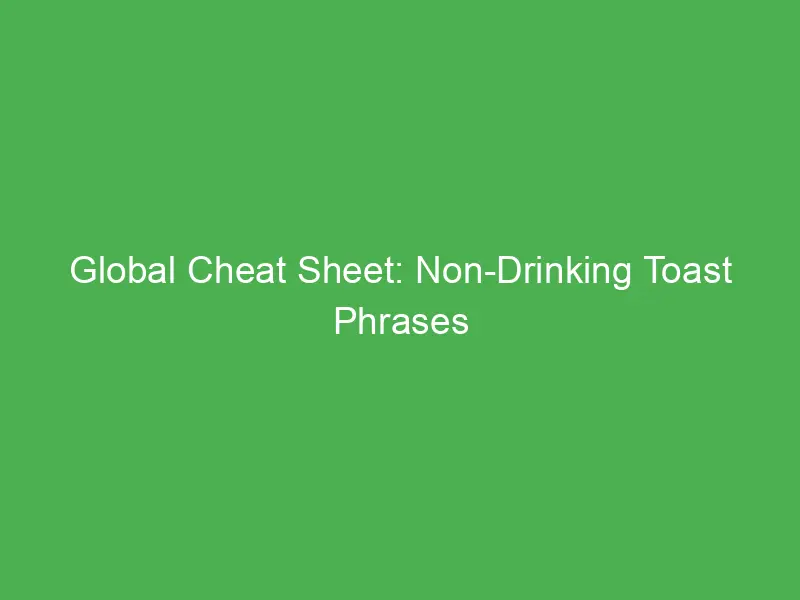For sober travellers, navigating social situations can sometimes feel daunting, especially when it comes to toasting in different cultures. Whether at a wedding in Europe or a festival in Asia, knowing how to raise a glass—without the glass—can enhance the experience and foster connections.
This cheat sheet offers a treasure trove of non-drinking toast phrases from every continent, allowing individuals to join in the celebration without compromising their choices. With these phrases, they can confidently participate in toasts, showing respect for local customs while embracing their own lifestyle.
From heartfelt sentiments to playful expressions, mastering these phrases will not only enrich their travels but also create memorable interactions along the way.
Non-Drinking Toasts in Europe
Travellers in Europe can enjoy social interactions while remaining sober by using non-drinking toast phrases. Each country offers unique expressions that convey goodwill and celebration without the need for alcohol.
Popular Phrases by Country
- United Kingdom: “Here’s to your health”
- France: “À votre santé” (To your health)
- Germany: “Prost!” (Cheers) – often used in a non-alcoholic context
- Italy: “Salute!” (Health)
- Spain: “¡Salud!” (Health)
- Sweden: “Skål!” (Cheers)
- Czech Republic: “Na zdraví!” (To health)
These phrases ensure individuals can engage in toasting traditions without alcohol.
Unique Customs and Traditions
Customs vary significantly across Europe regarding toasting.
- United Kingdom: Toasting often involves direct eye contact for good luck.
- Italy: It’s customary not to clink glasses with water; instead, use a gesture of goodwill.
- Germany: Non-drinkers often raise their glasses high, mirroring traditional gestures.
- Spain: Maintain lively conversation during toasts, focusing on camaraderie.
- France: When saying “À votre santé,” individuals may also incorporate hand gestures for emphasis.
Understanding these customs enhances the celebratory experience while adhering to sober practices.
Non-Drinking Toasts in Asia
Asia features a rich tapestry of languages and cultures, each with unique approaches to toasting. Familiarising oneself with regional phrases fosters respect and connection during celebrations without the need for alcohol.
Regional Variations
- China: “干杯” (gān bēi) translates to “dry cup.” Use this phrase to participate in toasts while keeping beverages alcohol-free.
- Japan: “乾杯” (kanpai) means “empty glass.” Sober individuals can participate by raising their drinks accompanied by this phrase.
- India: “Cheers” is widely understood in English-speaking contexts. It often works effectively in gatherings, ensuring inclusion.
- Thailand: “Chok dee” means “good luck.” This phrase serves as a toast, especially during celebratory events.
- Vietnam: “Một, hai, ba, dzô!” translates to “One, two, three, cheers!” Participants can raise glasses and say this without consuming alcohol.
Cultural Significance
Non-drinking toasts mark important cultural moments in Asia. To acknowledge unity and respect, toasting becomes an integral custom at weddings, birthdays, and festivals.
- China: Traditionally, toasting reflects honour and goodwill. Attendees often regard it as essential in cultivating relationships, showcasing sincerity.
- Japan: The kanpai signifies the start of a meal, embodying a collective spirit. This gesture promotes harmony among participants.
- India: While toasting differs by region, it generally conveys wishes for health and happiness, emphasising community bonding.
- Thailand: Chok dee connects celebrants, encouraging positivity and good fortune during significant occasions.
- Vietnam: Dzô consolidates camaraderie, fostering connection among friends and family during gatherings.
Understanding these phrases and their cultural importance enhances interactions while aligning with sober practices.
Non-Drinking Toasts in Africa
Africa boasts a rich tapestry of cultures and languages, each contributing unique non-drinking toast phrases. Understanding these expressions helps promote inclusivity in social gatherings.
Diverse Expressions Across Nations
- Nigeria: “Cheers to good friendship” promotes unity and fellowship.
- South Africa: “Here’s to us” emphasises togetherness in diverse settings.
- Kenya: “Kwaheri” conveys goodwill in Swahili, meaning farewell or goodbye.
- Ghana: “Nante yie” translates to “go well,” wishing safe travels or experiences.
- Ethiopia: “Enk’/ameti” expresses joy and gratitude in Amharic.
These phrases highlight the importance of community and connection, allowing sober individuals to partake in celebrations respectfully.
Historical Context
African toasting traditions stem from communal practices, often embedded in ceremonies and rituals. Toasts signify respect towards family, friends, and ancestors. Historically, they foster bonds during significant events such as weddings and initiation ceremonies. Incorporating non-drinking phrases encourages participation without compromising sobriety while honouring cultural values and customs.
Non-Drinking Toasts in the Americas
Non-drinking toasts in the Americas vary greatly across regions, reflecting cultural diversity. Engaging with local customs strengthens connections during gatherings.
Examples from North and South America
- United States: “Cheers to friendship” promotes camaraderie.
- Canada: “To your health” expresses goodwill.
- Mexico: “Salud, familia y amor” underlines the importance of family.
- Brazil: “Saúde” serves as a common toast for your health.
- Argentina: “Por la vida” celebrates life itself.
These phrases allow sober individuals to partake in festivities while honouring the spirit of celebration.
Influence of Indigenous Languages
Indigenous languages influence non-drinking toasts across the Americas, adding richness to customs.
- Quechua (Peru): “Sumaq” means “beautiful” and is often used in toasts.
- Nahuatl (Mexico): “Cualli” translates to “good” and functions as a celebratory term.
- Guaraní (Paraguay): “Aña kuéra” means “good spirits” when toasting.
Embracing these phrases not only respects local traditions but also highlights cultural heritage during celebrations.
Non-Drinking Toasts in Oceania
Oceania boasts a rich array of cultures, each offering unique non-drinking toast phrases that facilitate participation in celebrations. These phrases reflect both traditional and modern contexts.
Traditional and Modern Phrases
Common non-drinking toast phrases in Oceania include:
- “Cheers” – Used widely in Australia and New Zealand, this simple phrase creates a friendly atmosphere.
- “Kia ora” – A Māori greeting from New Zealand, expressing appreciation and acknowledgement.
- “To your health” – A phrase used across many Pacific Island nations, emphasising well-being and community unity.
- “Mā te wā” – A Māori phrase meaning “until we meet again,” often used during farewells or casual toasts.
These phrases seamlessly blend traditional significance with modern usage, enabling sober individuals to engage meaningfully in celebrations.
Social Practices Involved
Toasting traditions in Oceania vary across cultures and contexts:
- Eye contact – Maintaining eye contact during a toast signifies respect and sincerity, especially in Australian and New Zealand settings.
- Passing the drink – In some Pacific cultures, sharing a drink or passing around a ceremonial vessel reinforces community bonds.
- Inclusivity – Toasts often incorporate non-drinking phrases to include everyone, irrespective of their alcohol consumption choices.
These practices support respectful participation and foster deeper connections, ensuring celebrations remain enjoyable for all.
Key Takeaways
- Cultural Diversity: Non-drinking toast phrases vary significantly across continents, showcasing the unique customs and languages of each region.
- Enhanced Social Interaction: Mastering non-drinking toasts allows sober individuals to confidently partake in social gatherings, fostering connections and respect for local traditions.
- Regional Insights: Familiarity with toasting nuances—such as eye contact in the UK or communal gestures in Africa—can enrich experiences and promote inclusivity.
- Emphasis on Community: Many non-drinking toasts focus on goodwill, health, and unity, reflecting the underlying values of celebration and togetherness prevalent in different cultures.
- Inclusivity in Celebrations: Using alternative phrases enables everyone to join in the festivities without feeling left out, demonstrating that celebrations can be enjoyed regardless of alcohol consumption.
- Respect for Traditions: Understanding and using non-drinking toast phrases helps preserve cultural practices while catering to individuals’ sober lifestyles, ensuring respectful participation in various contexts.
Conclusion
Navigating social situations as a sober traveller can be challenging but it doesn’t have to be. With the right non-drinking toast phrases from every continent at their fingertips, individuals can engage in celebrations while honouring their sobriety.
These phrases not only enhance the travel experience but also foster connections with local cultures. By embracing these customs and participating in toasting traditions, sober individuals can enjoy meaningful interactions and create lasting memories.
Ultimately, understanding and using these non-drinking toast phrases allows everyone to partake in the spirit of celebration, reinforcing the idea that joy and connection can thrive without alcohol.
Frequently Asked Questions
What is the purpose of the article?
The article aims to help sober travellers navigate social situations, particularly toasts, in different cultures. It provides non-drinking toast phrases from around the world, enabling individuals to engage in celebrations while maintaining their sobriety.
What are some non-drinking toast phrases listed in the article?
The article includes phrases like “Here’s to your health” in the UK, “À votre santé” in France, “Cheers” in India, and “干杯” (gān bēi) in China, allowing sober individuals to participate in cultural toasting traditions.
Why is understanding local toasting customs important?
Understanding local toasting customs enhances the celebratory experience and fosters meaningful interactions. It shows respect for cultural practices while allowing sober individuals to engage fully in social situations.
Looking for more sober travel inspiration? Find your next adventure on our Homepage.
How does the article address toasts in Europe?
The article highlights specific non-drinking toast phrases from various European countries and explains cultural customs related to toasting, such as the importance of eye contact in the UK or lively conversations during toasts in Spain.
Are there non-drinking toast phrases specific to Asia?
Yes, the article presents unique non-drinking toast phrases from Asian countries, such as “Kanpai” in Japan and “Chok dee” in Thailand, enabling sober individuals to celebrate respectfully within their cultural contexts.
What insights does the article provide about African toasting traditions?
The article discusses various non-drinking toast phrases in Africa, emphasising community and connection. It also explores the historical significance of toasting traditions in ceremonies and rituals across different cultures.
How does the article relate to toasting in the Americas?
It highlights diverse non-drinking toast phrases across North and South America, such as “Salud” in Brazil and “Por la vida” in Argentina, showing how these phrases allow sober individuals to celebrate while honouring local customs.
What about non-drinking toasts in Oceania?
The article showcases non-drinking toast phrases in Oceania, like “Kia ora” from Māori culture and “Cheers” in Australia. It discusses social practices that facilitate respectful participation in toasting traditions across the region.

Quit drinking on 23 July 2021 after a two-day bender and swapped bars for border crossings and 12-step meetings. Three sober years, 36 countries, 113 travellers (totally dry), fuelled by street food, jelly babies, and a broken Google Maps app. Wandersober is my journal, my SEO lab, and my mission. Featured in GQ, Mirror, Evening Standard, MarketWatch, and more.






